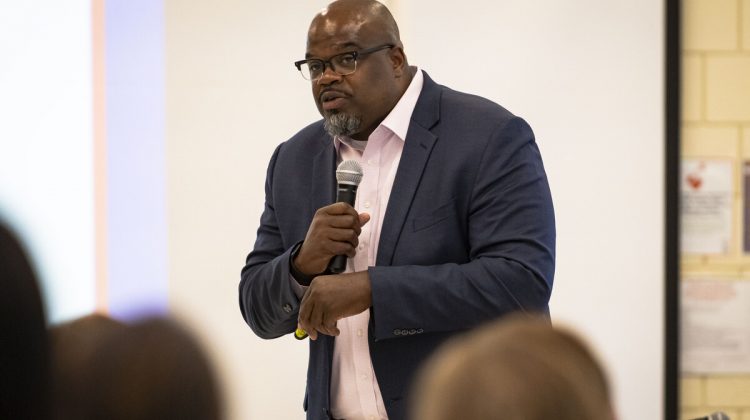LYNN — Educators emphasized the need for play-based learning and accessible child care during the first of 13 listening sessions hosted by the inter-agency Early Education and Child Care Task Force led by the Department of Education, which was held at North Shore Community College on Tuesday.
The task force was created in January through an executive order signed by Gov. Maura Healey.
Education Secretary Dr. Patrick Tutwiler, a former superintendent of Lynn Public Schools, said the goal is to take down as much information as possible over the next three weeks and acknowledge emerging themes that can be used to shape policy proposals before the General Court’s next budget season.
Some priorities Dr. Tutwiler outlined before the listening session were how the task force will survey other states’ and countries’ practices, identify how better coordination among agencies could make access to child care more accessible, and identify policies that will better recruit, train, and improve members of the task force.
“We’re interested in your ideas about opportunities to ensure high-quality early education and care that is accessible,” Dr. Tutwiler said.
He said the task force is committed to facilitating change. Dr. Tutwiler said that often, listening sessions will be held and then years later, people will ask where the feedback went.
During the listening session, Kathy Gallo, director of the Education and Care Partnership at NSCC, said she has seen a lack of motivation among her students who work in early-childhood education. She said her students are given impossible expectations driven by standards.
“They tell me about the lack of recess and outdoor time for kids,” she said. “They tell me about children who sit in front of smart boards for the majority of the day. They tell me that children have little opportunity for self-directed activities during the day.”
She added she has even heard stories of teachers “pulling down the shades” to hide from administrators that they are allowing their early-education students to play.
Gallo said that instead of viewing lessons as a scripted curriculum, administrators can provide teachers with the support for them to become “keen observers” of children in their natural element.
“Learning will naturally occur through robust play, and not rote memorization, worksheets, or activities that are predominantly teacher-directed or scripted,” she said.
LeeAnn Soucy, director of coaching and mentorship for the Education and Care Partnership, emphasized how in the scale of a person’s lifetime, childhood is only a small fragment.
“And it’s a magical time,” she said. “So let’s celebrate that magical time.”
She said there has been a push to make early education more academic, turning kindergarten into “the new first grade” and preschool into “the new kindergarten,” which has led to students in these grades not wanting to go to school.
“Research tells us that quality early-childhood education is based on hands-on, child-led learning,” Soucy added.
Jordan Rogers, speaking on behalf of the North Shore Labor Council, said the state needs “continued attention on raising wages” for educational professionals.
“After all, if our educators are not taken care of and thriving, how can we really expect our children to thrive with those educators?” he asked.
Kate-Marie Roycroft, CEO of the Massachusetts Alliance of YMCAs, emphasized a mixed-delivery approach to universal preschool.
Roycroft also said there needs to be flexibility in Commonwealth Preschool Partnership Initiative funding and how it interacts with state and federal funds.
She added that afterschool programs are part of the “continuum of care,” and they must be considered as the Commonwealth moves forward in youth social-emotional development.
Dr. Tutwiler said he is looking forward to hearing what will be said during the next 12 sessions. He added that he wasn’t surprised by anything raised during Tuesday’s session.
“The number of folks who lifted up the idea of a focus on play-based instruction is something that I’m hearing with greater frequency and something that we really should be paying close attention to,” Dr. Tutwiler said.

